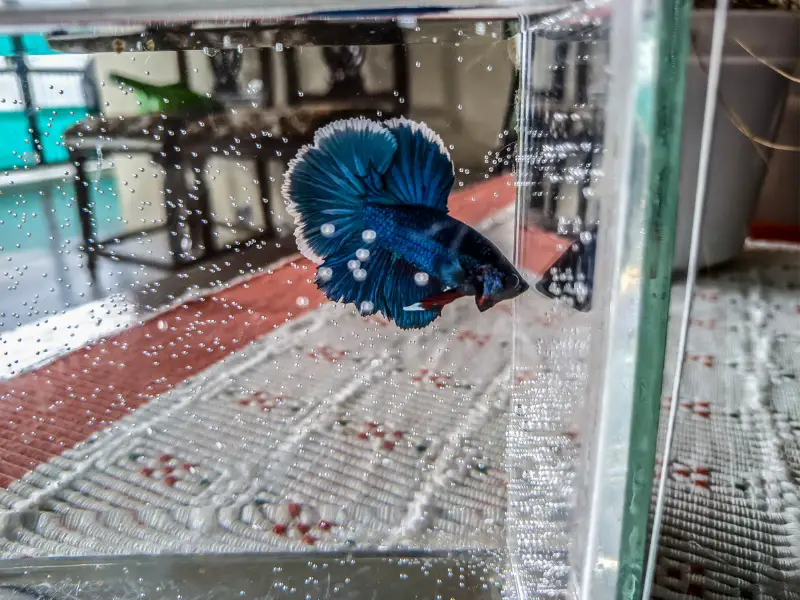Betta fish, also known as Siamese fighting fish, are popular pets due to their vibrant colors and unique personalities. However, owners may notice that their betta fish may start to lose color over time. This can be a cause for concern, as it may indicate an underlying health issue or poor living conditions.
There are several reasons why betta fish may lose their color. One possible cause is stress, which can be triggered by a variety of factors such as overcrowding, poor water quality, or a lack of hiding places. Another potential reason is aging, as betta fish tend to lose their vibrancy as they get older. Additionally, certain illnesses or diseases can also cause betta fish to lose color, such as fin rot or velvet disease.
It is important for betta fish owners to closely monitor their pet’s color and behavior, as any changes may indicate a problem. Taking steps to improve living conditions, such as providing a spacious tank with proper filtration and adding hiding places, can help reduce stress and prevent color loss. If color loss is accompanied by other symptoms, such as lethargy or loss of appetite, it is important to seek veterinary care to properly diagnose and treat any underlying health issues.
Causes for Color Loss in Betta Fish

Betta fish are known for their vibrant and beautiful colors, but sometimes they can lose their colors. There are several reasons why betta fish can lose their color, including stress, poor nutrition, age, and disease.
Stress
Stress is one of the most common reasons why betta fish lose their color. Stress can be caused by a variety of factors, such as poor water quality, overcrowding, or sudden changes in the environment. When betta fish are stressed, they may become less active, stop eating, and lose their color.
Poor Nutrition
Betta fish require a balanced diet to maintain their vibrant colors. If they are not getting the right nutrients, their colors may fade. It’s important to feed betta fish a high-quality diet that includes a variety of foods, such as pellets, flakes, and frozen or live foods.
Age
As betta fish age, their colors may begin to fade. This is a natural process and nothing to be concerned about. However, it’s important to make sure that the betta fish is not experiencing any other health problems that may be causing the color loss.
Disease
The disease can also cause betta fish to lose their color. Common diseases that can cause color loss include fin rot, velvet, and ich. If a betta fish is showing signs of illness, such as lethargy, loss of appetite, or abnormal behavior, it’s important to seek veterinary care as soon as possible.
Overall, there are several reasons why betta fish can lose their color. By addressing the underlying cause, betta fish owners can help their fish regain their vibrant colors and maintain their overall health and well-being.
Symptoms of Color Loss
Betta fish are known for their vibrant and striking colors. However, sometimes these colors can fade or become dull. This can be a sign of an underlying health issue, and it is important to recognize the symptoms of color loss in betta fish.
One of the most noticeable symptoms of color loss is a change in the brightness or intensity of the betta fish’s color. The fish may become paler, and the colors may appear washed out or faded. In some cases, the colors may become blotchy or uneven.
Another symptom of color loss is a change in the fish’s behavior. Betta fish that are experiencing color loss may become lethargic or inactive. They may also lose their appetite, which can lead to weight loss and other health problems.
In some cases, color loss may be accompanied by other physical symptoms. For example, the fish may develop white or gray patches on its body, or it may develop lesions or ulcers. These symptoms can be a sign of a bacterial or fungal infection, which can be serious if left untreated.
It is important to note that color loss can also be a natural part of the aging process for betta fish. As the fish gets older, its colors may become less vibrant. However, if the color loss is sudden or accompanied by other symptoms, it is important to seek veterinary care for the fish as soon as possible.
Prevention of Color Loss

Proper Diet
A well-balanced diet is essential for maintaining the vibrancy of betta fish. A diet that is high in protein and vitamins is recommended. Betta fish can be fed pellets, flakes, or live food such as brine shrimp or bloodworms. It is important to avoid overfeeding as this can lead to obesity and other health problems. Feeding the fish small amounts of food multiple times a day is preferable to feeding them one large meal.
Stress Management
Stress is a major factor that can cause betta fish to lose their color. Stress can be caused by a variety of factors such as overcrowding, poor water quality, and sudden changes in the environment. To prevent stress, it is important to maintain a clean and healthy environment for the fish. The tank should be properly cycled, and the water should be changed regularly. It is also important to avoid overcrowding the tank and to provide the fish with plenty of hiding places.
Regular Health Check
Regular health checks can help prevent color loss in betta fish. It is important to monitor the fish for signs of illness or disease. Common signs of illness include lethargy, loss of appetite, and discoloration. If any of these symptoms are observed, it is important to take the fish to a veterinarian who specializes in fish health. Regular health checks can also help prevent the spread of disease and ensure that the fish are healthy and thriving.
In conclusion, preventing color loss in betta fish requires a proper diet, stress management, and regular health checks. By following these guidelines, betta fish owners can ensure that their fish remain healthy and vibrant for years to come.
Treatment for Color Loss
Betta fish are known for their vibrant and striking colors, but sometimes their colors can fade or become dull. This can be a sign of stress or illness, and it is important to address the issue promptly to help your fish regain their color and overall health.
Dietary Changes
One of the first steps to treating color loss in betta fish is to adjust their diet. Providing a balanced and nutritious diet can help boost their immune system and improve their overall health. Betta fish require a diet that is high in protein and low in carbohydrates. Some recommended foods include:
- High-quality betta pellets
- Frozen or live brine shrimp
- Frozen or live bloodworms
It is important to avoid overfeeding your betta fish, as this can lead to obesity and other health problems. Additionally, feeding your fish a varied diet can help ensure they are getting all of the necessary nutrients.
Environmental Adjustments
Another important aspect of treating color loss in betta fish is to ensure they are living in a healthy and stress-free environment. Some environmental adjustments that can help improve your fish’s health include:
- Keeping the water clean and well-filtered
- Maintaining a consistent water temperature between 76-82°F
- Providing plenty of hiding places and plants for your fish to explore
- Avoiding overcrowding in the tank
It is also important to monitor the water quality regularly and perform partial water changes as needed to keep the water parameters stable.
Medical Treatments
If dietary changes and environmental adjustments do not improve your betta fish’s color loss, it may be necessary to seek medical treatments. Some common medical treatments for betta fish include:
- Antibiotics to treat bacterial infections
- Anti-parasitic medications to treat parasitic infections
- Fungicides to treat fungal infections
It is important to consult with a veterinarian or aquatic specialist before administering any medications to your fish, as some medications can be harmful if not used properly.
Overall, treating color loss in betta fish requires a combination of dietary changes, environmental adjustments, and sometimes medical treatments. By addressing the issue promptly and providing proper care, you can help your fish regain their vibrant colors and overall health.
Conclusion
In conclusion, betta fish losing color is a common issue that many betta fish owners face. There are several factors that can contribute to this problem, including poor water conditions, stress, and genetics.
To prevent betta fish from losing color, it is important to maintain a clean and healthy environment for them. This includes regular water changes, proper filtration, and providing a balanced diet. Additionally, it is important to minimize stressors in their environment, such as sudden changes in water temperature or aggressive tank mates.
If a betta fish does start to lose color, there are several steps that can be taken to address the issue. These include improving water quality, reducing stress, and adjusting the fish’s diet. It is important to note, however, that some color loss may be due to genetics and cannot be reversed.
Overall, by taking proper care of betta fish and addressing any issues that arise, owners can help ensure that their fish remain healthy and vibrant.
Related Articles: